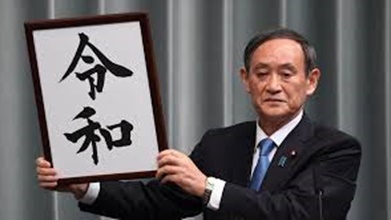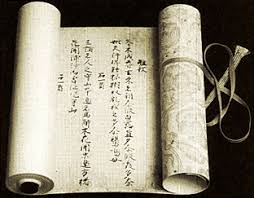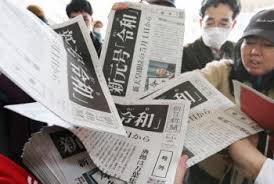新元号は「令和」
2019年度の初回のClose-Up Wordsは、新元号のニュースからです。
元号は、an (imperial ) era name や emperor's reign となっていました。時代精神を反映させるものと考えられる元号が何になるのかについての憶測が蔓延しましたね。
With gengō often seen as reflective of the zeitgeist, speculation had been rife about what the new era would be named.
※ zeitgeist =時代精神、時代思潮、ツァイトガイスト(ドイツ語でspirit of the times)
※ rife =噂などがはびこって、充満して
BBCでは、元号は次の数十年を方向付ける、日本人にとって重要なものだと説明していました。
Each gengo's name aims to set the tone for the upcoming decades, and remains significant to most Japanese in their daily life.
※ set the tone for~ =~基調を打ち出す、方向づける、~の気風を決める、~の雰囲気を決定づける
元号は、読みやすく書きやすいか、漢字二語からなるか、既存の言葉とかぶっていないか、今後の時代の理想を凝縮したものかを確実にして= ensure they are easy to read and write, consist of two kanji, do not overlap with any existing word, and encapsulate an ideal for the times ahead、最終候補= shortlist を絞り込んでいく= narrow down そうです。
※ encapsulate =要約する、縮約する、手短に述べる、カプセルに包む
明治、大正、昭和、平成の「M・T・S・H」が頭文字になることも避けたようですね。
The government was also reportedly careful to avoid picking any name with a first initial that overlaps with any of its four immediate predecessors, namely H (Heisei), S (Showa), T (Taisho) and M (Meiji).
事前に漏れる= divulge / leak 事がないように、政府は有識者会議メンバーの携帯電話を預かり、会議のあともしばらくは、隔離したままにするということまでしました。
The government went so far as to confiscate cellphones of private-sector representatives and keep them sequestered long after the meeting wrapped up.
※ go so far as to ~ =~しさえする、ついに~までやってしまう
※ confiscate =没収する、押収する
※ sequester =引き離す、隔離する、没収する
そしてついに、菅義偉官房長官が新元号『令和』の書を掲げました。
The Chief Cabinet Secretary held up the name written in calligraphy in sumi black ink.

英語ニュース配信が最も早かったガーディアン、BCCでは、当初、『令和』を “decree” and “peace”と説明していました。確かに令には decree / order(命令)の意味もありますが、この場合は以下が正解ですね。
The kanji can be read to mean “fortunate” or “auspicious”, and “peace” or “harmony”.
※ auspicious =前兆のよい、縁起のいい
ガーディアンも、BBCもしれっと改定していました。
出典は万葉集。以下、万葉集の説明です。
“Manyoshu” (The Collection of Ten Thousand Leaves) was compiled during the Nara Period (710-784).
The collection contains about 4,500 poems composed over 350 years.
The poems in the collection were composed by people from all walks of life, from celebrated poets, emperors, to coast guards, to nameless farmers.
※ all walks of life =あらゆる[さまざまな]職業および(社会的)地位、あらゆる階層の人々
Manyoshu contained poems by people of various social status, including emperors, noblemen and noblewomen, warriors and ordinary farmers.
他に、ガーディアンでは the oldest existing anthology(選集)。
Japan Timesではthe oldest existing compilation of Japanese poetry 等がありました。

安倍首相は「春の訪れを告げ、見事に咲き誇る梅の花のように一人ひとりが明日への希望とともに、それぞれの花を大きく咲かせることができる、そうした日本でありたいとの願いを込め決定した」と述べました。
“Each Japanese can have their own flowers bloom with their hopes for tomorrow like the blossoms of a Japanese apricot, which bloom in full glory after enduring severe winter cold and become the harbinger of the arrival of spring,” Abe said. (朝日より)
※ harbinger =先触れ、前兆
元号を使うのは現代社会では日本だけとのこと。日本も太陽暦と併用です。
Japan is the only country in the world that uses the era name system, which has its roots in China, though the Gregorian calendar is also in common use.
※ Gregorian calendar =グレゴリオ暦、新暦、太陽暦→ solar calendar, new calendar
各地で号外を奪い合う人々の姿が報道されてました。
People try to get their hands on newspaper extra editions reporting the next era name, Reiwa.
People grab extra editions of newspapers reporting Japan's new era name 'Reiwa' in front of Tokyo's Shimbashi Station on April 1, 2019.
※ 号外は extra だけでもOK

平成もあと fortnight (2週間)となり、『平成最後の〇〇』という言葉があちこちで聞かれますね。
今週も、皆さまにとって平和で充実した1週間となりますように。


